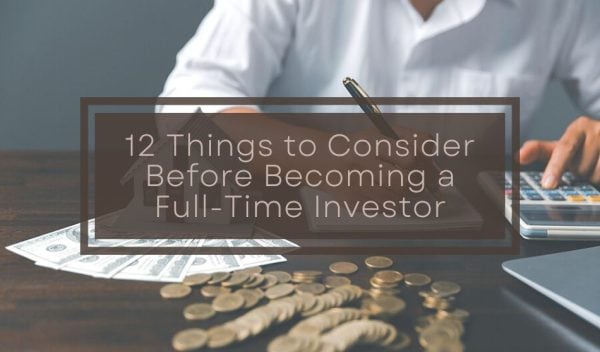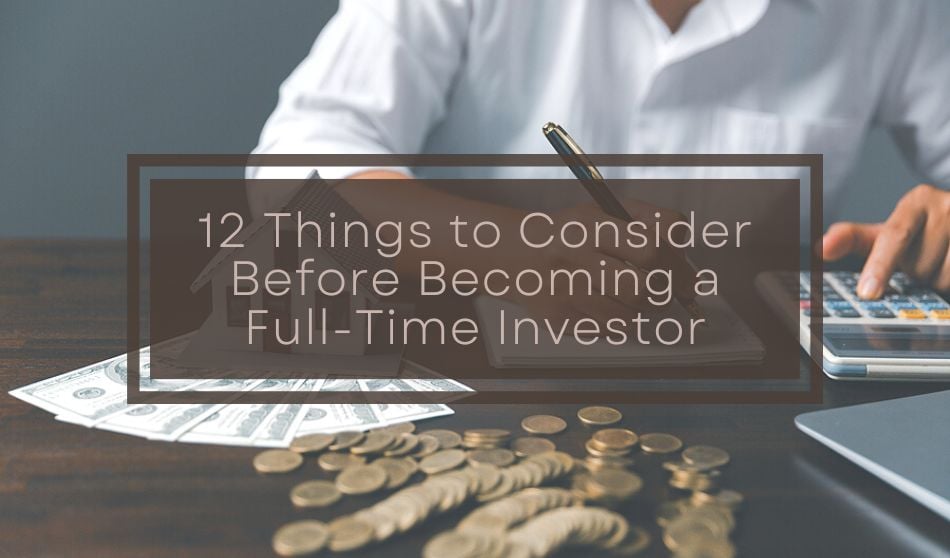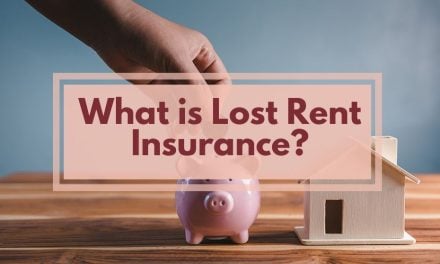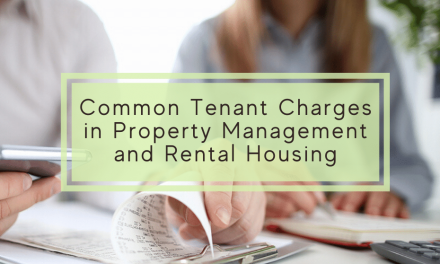
If you’ve bought a house, technically, you’ve already stepped onto the path of an investor. But what does it mean to leave your day job and become a full-time investor? There’s more to it than just handing in your notice and looking for property to buy.
It requires tremendous fortitude, faith, and persistence. If you don’t have the capital you need or you don’t know the direction you want to go, consider becoming a part-time investor. This gives you more time to gather your courage and make a plan.
Here are 12 things to consider before becoming a full-time investor.
1. Your Tolerance for Risk
This is the first consideration for a reason. Becoming a full-time investor comes with no guarantees. You may find a gold mine and retire within a couple years, or you may lose all your savings on the first investment. You’ll likely fall somewhere in between those two extremes, but it can be helpful to start with knowledge of the cold, hard truth about the risk involved.
2. Your Support System
A support system is critical, especially in the beginning stages of full-time investing. Consider whether you have the support of your family and friends.
Mentorships at this stage are an invaluable resource. See if you can find a community of investors, either online or local to you, with members who have made the move to full-time investing. Schedule a meeting to pick their brains and ask for advice.
3. The Opportunity Cost
Savvy investors consider the opportunity cost of each investment. In this case, consider what you’re giving up to become a full-time investor. Health insurance? 401(k) matching? Paid vacation days to go on trips with your family? Weigh those costs to see if the potential rewards are worth the risk.
4. Your Financial Goals
If you determine that the risk is worth it, set some financial goals. This might include the annual income you want to earn or a total dollar amount in the bank. It could also be a specific number of properties or other types of investment you want to own. Every investor’s goals will be different, but writing them down is important.
5. Your Plan for Becoming a Real Estate Investor
Becoming a full-time investor is a business like any other. Create a business plan and make sure you understand what it means to be self-employed.
Take advantage of the tools available for business owners and real estate investors, like property management software designed specifically for rental accounting.
“It’s way easier to start out with clean accounting records when you have one property, so you can start good habits early on,” explains Nathan Miller, President of Rentec Direct property management software. “The less time you spend trying to keep track of paper records and receipts, the more time you can spend watching your investment portfolio grow.”
6. Your Understanding of the Process
When it comes to real estate investing, make sure you understand closing costs for buyers and sellers, including Realtor commission.
It’s also a good idea to familiarize yourself with technical real estate lingo before you start buying and selling properties.
7. The Amount of Work Involved
Becoming a full-time investor is hard work, possibly harder than a regular 9-to-5 job because:
- The hours are much longer
- The hours aren’t traditional
- Procrastinators beware: You make your own schedule
- There’s a learning curve
However, there can also be tremendous freedom in being your own boss. For some new investors, this is priceless.
8. Your Record-Keeping Skills
The mountain of paperwork before, during, and after closing on a home may seem endless and suffocating. The paper trail continues when you become a full-time investor. You’ll need to find a good system of record-keeping to stay organized when it’s time to report income and pay taxes.
9. Your Startup Capital
Make no mistake: It’s possible to start investing with very little money. For as little as $10,000, you can invest in anything from a rental property to a business startup. But you have to have some capital. This might be equity in your own home, financial backing from a partner, or cash from a crowdfunding campaign.
It’s important to leave yourself a safety net, so figure out exactly how much you have to work with.
10. The Type of Investment
Investments come in all shapes and sizes, from an entire building full of tenants to a real estate investment trust in which you own pieces of a property.
Recognize which investments interest you. Your answer may be influenced by how much capital you have to work with but, in general, consider:
- How hands-on you want to be managing your investments
- If you have DIY skills or money to hire contractors
- If there are particular sectors you prefer, such as retail, tech, or medical space
11. Where You Live
There are no rules that restrict your investments to your physical location, but it can be helpful. You’ll have a better understanding of potential places to invest when you’re looking where you live rather than online.
However, there are some benefits to buying outside of your geographic location. For example, if you want to manage a vacation property but don’t live in a tourist destination, you’ll need to look elsewhere to build your portfolio.
12. Your Patience
There are very few investments, if any, that will make you rich overnight. In fact, some of the most consistently profitable investments take time to become profitable. To quote Jean-Jacques Rousseau, “Patience is bitter, but its fruit is sweet.” Be prepared to wait for your investments to bear fruit.






